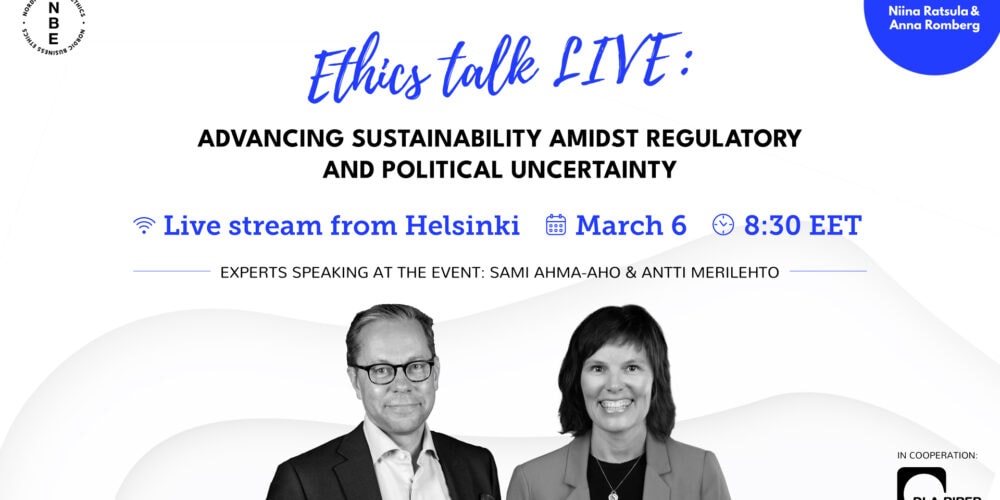Ethics talk live: Human rights in practice
Salla Tuominen and Parul Sharma participated in EthicsTalk LIVE on human rights in practice in January 2022 together with Annika Ramsköld and Greg Priest. This blog post summarises Salla’s opening on the regulatory situation for business and human rights as well as lists the key takeaways from Parul’s recommendations.
Head over to the event page, if you want to read more about the panelists. In case you are interested in watching the whole event, the recording is available here.
The upcoming EU regulation
Soft guidelines and instructions have been around for a while, but the legislation has not been very successful in making a difference. The legislation is fragmented and covers only certain sized businesses and thus the EU has a lot of pressure for the upcoming regulation. Last year, the European Parliament adopted a resolution on corporate responsibility and accountability. It was heavily stressed that even though organisations do need to respect human rights and the environment, it is up to the governments and states to protect humans and the environment, and they cannot push the responsibility to private actors.
On a more positive note, the upcoming regulatory regime will be posed to all organisations regardless of their size or their field of operation. This has not happened before in regard to human rights.
Finnish legislation
The Nordic countries are following the EU legislation closely and Norway is the first one to implement a law during 2022. In Finland the current governmental program includes a study on potentiality to enact a new law on corporate social responsibility. Studies have been made on legal frameworks and on the current situation with Finnish companies and human rights. It seems that human rights are respected and recognised but embedding it into the business operations needs a lot of work. Additionally, companies are wondering how they can improve the communications and reporting on human rights.
In Finland the core is the same with the EU regulation: exercise the duty of care and how in practice the due diligence would be handled. It has not been decided whether there will be a new law or if some currently available law will be amended, fulfilled, and supplemented. In Salla’s opinion harmonization of the legal spectrum would be beneficial, as there are multinational companies operating on several jurisdictions.
Parul’s recommendations
Western companies, and especially in Northern European countries mainly regard Human rights as synonymous to child labour. The new legislation is trying to address this by trying to stress human protection as a whole within the due diligence process. Companies need to build competencies and abilities around risk awareness, risk analysis and risk management. The key points for risk management are remedy, follow-up, handholding, control, and verification. Parul’s recommendations include:
- As part of an organisation’s internal due diligence, human rights awareness needs to reach the top-level managers and board members.
- Increase handholding abilities of customers and vendors as well as the ability to follow up on contractual demands.
- Critical review of contractual clauses on high-risk suppliers.
- More collaboration between legal, compliance, purchasing and sustainability departments.
- Training and practical guidance for suppliers as well as stricter contractual clauses.
- Use the knowledge of NGO’s to follow-up and collaborate with suppliers
We hope you find these reflections from our EthicsTalk live useful. If you are looking for more inspiration, head over to the media section to browse through the previous blogs and podcasts or check out the previous EthicsTalk LIVE recordings and register to the upcoming events.



